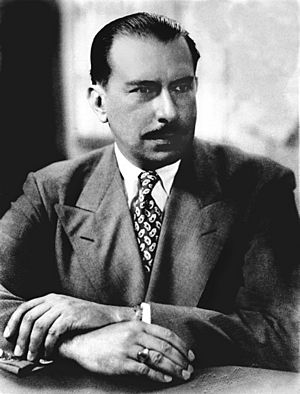Teodoro Picado Michalski facts for kids
Quick facts for kids
Teodoro Picado Michalski
|
|
|---|---|

Picado in 1944
|
|
| 30th President of Costa Rica | |
| In office 8 May 1944 – 20 April 1948 |
|
| Preceded by | Rafael Ángel Calderón Guardia |
| Succeeded by | Santos León Herrera (interim) |
| Deputy of the Constitutional Congress | |
| In office 1 May 1938 – 30 April 1944 |
|
| Constituency | San José Province |
| Personal details | |
| Born | 10 January 1900 San José, Costa Rica |
| Died | 1 June 1960 (aged 60) Managua, Nicaragua |
| Political party | National Republican Party |
| Spouses | Mercedes Lara Fernández Etelvina Ramírez Montiel |
| Signature |  |
Teodoro Picado Michalski (born January 10, 1900 – died June 1, 1960) was the President of Costa Rica from 1944 to 1948. He was known for his intelligence and his efforts to modernize the country's laws.
Contents
Teodoro Picado's Presidency in Costa Rica
Teodoro Picado became president right after Rafael Ángel Calderón Guardia. He was followed by a temporary government led by José Figueres Ferrer. Picado was a very smart president. He was also more calm and less likely to cause arguments than the presidents before and after him.
Becoming President: The 1944 Election
Before he was president, Teodoro Picado was the head of the Constitutional Congress. In this role, he helped approve important social changes. These changes were part of the government of Rafael Ángel Calderón Guardia (1940–1944).
Calderón strongly supported Picado in the 1944 election. The election campaign was quite rough for Costa Rica. Some parts even became violent. Historians Fabrice Lehoucq and Ivan Molina studied the election. They found some small election problems in a few places. However, these problems were not big enough to change the election's outcome. Picado won by a large margin, getting twice as many votes as his opponent.
Key Actions as President
Even though some people questioned the election, Picado was a much calmer leader than Calderón. Calderón had upset many rich coffee growers and business owners in the country.
Picado's government passed many laws to update the country. The most important change was the election reform in 1945. This reform created a modern set of election laws. It also set up a Supreme Tribunal of Elections. This reform happened partly because of the problems during the 1944 election campaign.
The election laws created then are still used today. They help make sure Costa Rica has fair and democratic elections. President Picado saved this reform with a special order. It was called the "Blank Check" decree. This order allowed all the new election rules to become law quickly.
The 1948 Revolution and Picado's Exile
In the 1948 election, Picado supported his predecessor, Rafael Ángel Calderón Guardia. Calderón hoped to become president again.
However, Calderón lost the election to Otilio Ulate Blanco. This was a very close election. It was also the first time elections were held under the new election laws. There were some issues with counting votes and lost ballots. Because of this, Calderón's supporters in the legislature said the election results were not valid.
In March and April 1948, protests about the election grew into a revolution. José Figueres Ferrer led this revolution. He had help from a group called "La Legion del Caribe." This group included Fidel Castro. Figueres's forces defeated the Costa Rican Army. The army was loyal to Calderón and President Picado.
This 44-day civil war was very bloody. More than 2,000 people died. It was the most violent event in Costa Rica in the 20th century.
Leaving the Presidency and Life in Exile
Teodoro Picado was not forced out of office by violence. Instead, he gave up the presidency to his vice-president, Santos León Herrera. Herrera became the temporary president. This was part of a deal to end the fighting. The deal was made to stop the uprising led by Figueres over the disputed 1948 election.
After the revolution, the political situation in Costa Rica was difficult. José Figueres's government was in power. Picado decided to live in Nicaragua in exile. He stayed there until he passed away. Later, his body was brought back to Costa Rica. He is buried in Paraíso, Cartago, the town where his family came from.
More About Teodoro Picado
Teodoro Picado was a respected historian. He wrote many books and essays on history. He was a member of important groups like the Academy of Geography and History of Costa Rica. He also belonged to the Academy of the Spanish Language of Nicaragua.
He served as the Secretary of Education from 1932 to 1936. He was also the Director of the Institute of Alajuela in 1930. He taught civil law at the Old Law School starting in 1937.
Picado spoke several languages, including English, Polish, and French. He could also speak some Russian, Italian, and German. He was very knowledgeable about law and classic studies. He became a lawyer in 1922. He was a student of Ricardo Jiménez Oreamuno, who was president three times.
Picado's Family Background
Teodoro Picado's parents were both doctors. His father was Teodoro Picado Marín. His mother was Jadwiga Warnia Michalska Wodziwodzka, who was from Poland. She was the first female doctor in Costa Rica. His parents met and married in Switzerland while studying medicine.
Teodoro Picado Michalski married Mercedes Lara Fernández first. They had two children, Teodoro Picado Lara and Clemencia Picado Lara. Later, he married Etelvina Ramírez. They had one daughter, María Cecilia Picado Ramírez. She lives in Venice, Italy, and has two daughters. Picado also has relatives in Poland.
See also
 In Spanish: Teodoro Picado Michalski para niños
In Spanish: Teodoro Picado Michalski para niños

